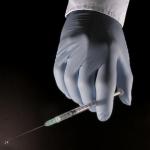Vaccines must be rigorously tested before they are deployed en masse. The reason is that vaccines can have unpredictable, unintended effects.
mumps
"Things have not gotten as stupid as they are going to get."
The MMR vaccine protects against three viral diseases: measles, mumps, and rubella, hence it's name.
A multidisciplinary team from Texas just published their work in PLOS Medicine on U.S.
I recently returned from spending two weeks on a college campus in upstate New York. While there, I was surprised to see, in every building that I entered, signs posted with health information about mumps. Mumps...
A large Canadian study shows tha







